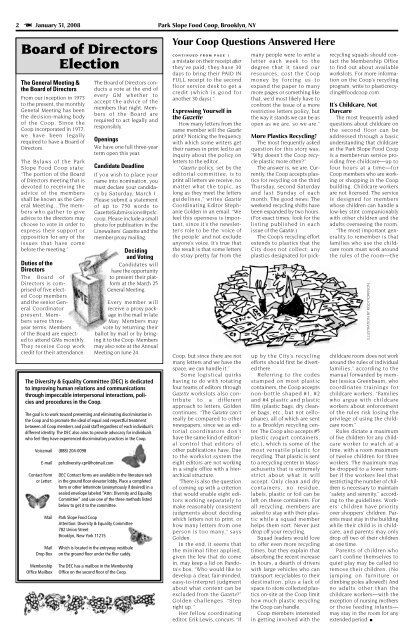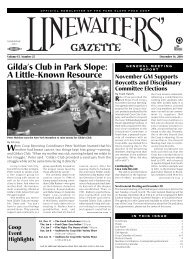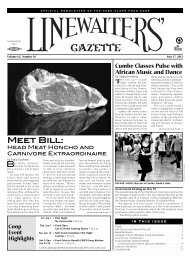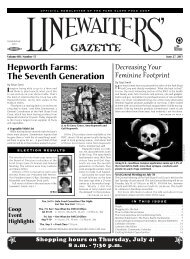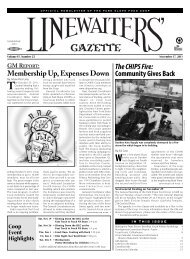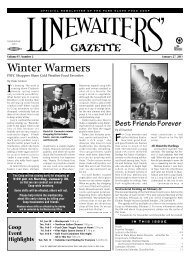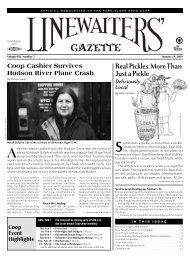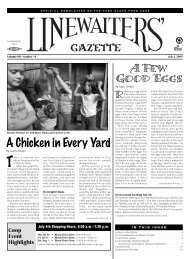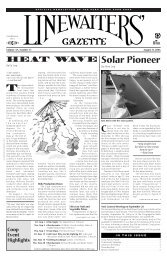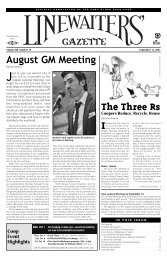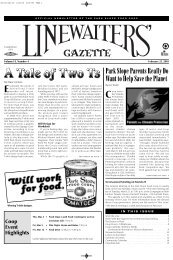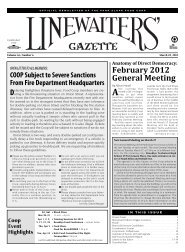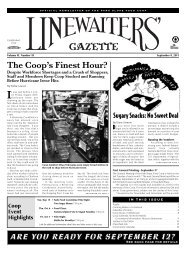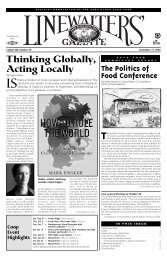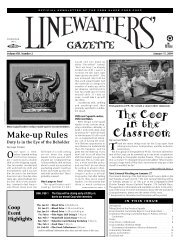Your Coop Questions Answered Here - Park Slope Food Coop
Your Coop Questions Answered Here - Park Slope Food Coop
Your Coop Questions Answered Here - Park Slope Food Coop
Create successful ePaper yourself
Turn your PDF publications into a flip-book with our unique Google optimized e-Paper software.
2 January 31, 2008 <strong>Park</strong> <strong>Slope</strong> <strong>Food</strong> <strong>Coop</strong>, Brooklyn, NY<br />
Board of Directors<br />
Election<br />
The General Meeting &<br />
the Board of Directors<br />
From our inception in 1973<br />
to the present, the monthly<br />
General Meeting has been<br />
the decision-making body<br />
of the <strong>Coop</strong>. Since the<br />
<strong>Coop</strong> incorporated in 1977,<br />
we have been legally<br />
required to have a Board of<br />
Directors.<br />
The Bylaws of the <strong>Park</strong><br />
<strong>Slope</strong> <strong>Food</strong> <strong>Coop</strong> state:<br />
“The portion of the Board<br />
of Directors meeting that is<br />
devoted to receiving the<br />
advice of the members<br />
shall be known as the General<br />
Meeting…The members<br />
who gather to give<br />
advice to the directors may<br />
choose to vote in order to<br />
express their support or<br />
opposition for any of the<br />
issues that have come<br />
before the meeting.”<br />
Duties of the<br />
Directors<br />
The Board of<br />
Directors is comprised<br />
of five elected<br />
<strong>Coop</strong> members<br />
and the senior General<br />
Coordinator<br />
present. Members<br />
serve threeyear<br />
terms. Members<br />
of the Board are expected<br />
to attend GMs monthly.<br />
They receive <strong>Coop</strong> work<br />
credit for their attendance.<br />
The Diversity & Equality Committee (DEC) is dedicated<br />
to improving human relations and communications<br />
through impeccable interpersonal interactions, policies<br />
and procedures in the <strong>Coop</strong>.<br />
The goal is to work toward preventing and eliminating discrimination in<br />
the <strong>Coop</strong> and to promote the ideal of equal and respectful treatment<br />
between all <strong>Coop</strong> members and paid staff regardless of each individual’s<br />
different identity. The DEC also aims to provide advocacy for individuals<br />
who feel they have experienced discriminatory practices in the <strong>Coop</strong>.<br />
Voicemail (888) 204-0098<br />
E-mail<br />
Contact Form<br />
or Letter:<br />
Mail<br />
Mail<br />
Drop Box<br />
Membership<br />
Office Mailbox<br />
psfcdiversity-cpr@hotmail.com<br />
The Board of Directors conducts<br />
a vote at the end of<br />
every GM whether to<br />
accept the advice of the<br />
members that night. Members<br />
of the Board are<br />
required to act legally and<br />
responsibly.<br />
Openings<br />
We have one full three-year<br />
term open this year.<br />
Candidate Deadline<br />
If you wish to place your<br />
name into nomination, you<br />
must declare your candidacy<br />
by Saturday, March 1.<br />
Please submit a statement<br />
of up to 750 words to<br />
GazetteSubmissions@psfc.<br />
coop. Please include a small<br />
photo for publication in the<br />
Linewaiters’ Gazette and the<br />
member proxy mailing.<br />
Deciding<br />
and Voting<br />
Candidates will<br />
have the opportunity<br />
to present their platform<br />
at the March 25<br />
General Meeting.<br />
Every member will<br />
receive a proxy package<br />
in the mail in late<br />
May. Members may<br />
vote by returning their<br />
ballot by mail or by bringing<br />
it to the <strong>Coop</strong>. Members<br />
may also vote at the Annual<br />
Meeting on June 24.<br />
DEC Contact forms are available in the literature rack<br />
in the ground floor elevator lobby. Place a completed<br />
form or other letter/note (anonymously if desired) in a<br />
sealed envelope labeled “Attn: Diversity and Equality<br />
Committee” and use one of the three methods listed<br />
below to get it to the committee.<br />
<strong>Park</strong> <strong>Slope</strong> <strong>Food</strong> <strong>Coop</strong><br />
Attention: Diversity & Equality Committee<br />
782 Union Street<br />
Brooklyn, New York 11215<br />
Which is located in the entryway vestibule<br />
on the ground floor under the flier caddy.<br />
The DEC has a mailbox in the Membership<br />
Office on the second floor of the <strong>Coop</strong>.<br />
<strong>Your</strong> <strong>Coop</strong> <strong>Questions</strong> <strong>Answered</strong> <strong>Here</strong><br />
CONTINUED FROM PAGE 1<br />
a mistake on their receipt after<br />
they’ve paid, they have 30<br />
days to bring their PAID IN<br />
FULL receipt to the second<br />
floor service desk to get a<br />
credit (which is good for<br />
another 30 days).”<br />
Expressing <strong>Your</strong>self in<br />
the Gazette<br />
How many letters from the<br />
same member will the Gazette<br />
print? Noticing the frequency<br />
with which some writers get<br />
their names in print led to an<br />
inquiry about the policy on<br />
letters to the editor.<br />
“Gazette policy, set by the<br />
editorial committee, is to<br />
print all letters we receive, no<br />
matter what the topic, as<br />
long as they meet the letters<br />
guidelines,” writes Gazette<br />
Coordinating Editor Stephanie<br />
Golden in an email. “We<br />
feel this openness is important,<br />
since it’s the newsletter’s<br />
role to be the ‘voice of<br />
the people’ and not exclude<br />
anyone’s voice. It’s true that<br />
the result is that some letters<br />
do stray pretty far from the<br />
<strong>Coop</strong>, but since there are not<br />
many letters and we have the<br />
space, we can handle it.”<br />
Some logistical quirks<br />
having to do with rotating<br />
four teams of editors through<br />
Gazette workslots also contribute<br />
to a different<br />
approach to letters, Golden<br />
continues. “The Gazette can’t<br />
really be compared to other<br />
newspapers, since we as editorial<br />
coordinators don’t<br />
have the same kind of editorial<br />
control that editors of<br />
other publications have. Due<br />
to the workslot system the<br />
eight editors are not working<br />
in a single office with a hierarchical<br />
structure.<br />
”There is also the question<br />
of coming up with a criterion<br />
that would enable eight editors<br />
working separately to<br />
make reasonably consistent<br />
judgments about deciding<br />
which letters not to print, or<br />
how many letters from one<br />
person is too many,” says<br />
Golden.<br />
In the end, it seems that<br />
the minimal filter applied,<br />
given the few that do come<br />
in, may keep a lid on Pandora’s<br />
box. “Who would like to<br />
develop a clear, fair-minded,<br />
easy-to-interpret judgment<br />
about what content can be<br />
excluded from the Gazette?”<br />
Golden challenges. “Step<br />
right up. “<br />
Her fellow coordinating<br />
editor, Erik Lewis, concurs. “If<br />
many people were to write a<br />
letter each week to the<br />
degree that it taxed our<br />
resources, cost the <strong>Coop</strong><br />
money by forcing us to<br />
expand the paper to many<br />
more pages or something like<br />
that, we’d most likely have to<br />
confront the issue of a more<br />
restrictive letters policy, but<br />
the way it stands we can be as<br />
open as we are, so we are.”<br />
More Plastics Recycling?<br />
The most frequently asked<br />
question for this story was,<br />
“Why doesn’t the <strong>Coop</strong> recycle<br />
plastic more often?”<br />
The answer is, we are. Currently,<br />
the <strong>Coop</strong> accepts plastics<br />
for recycling on the third<br />
Thursday, second Saturday<br />
and last Sunday of each<br />
month. The good news: The<br />
weekend recycling shifts have<br />
been expanded by two hours.<br />
(For exact times, look for the<br />
listing published in each<br />
issue of the Gazette.)<br />
The <strong>Coop</strong>’s recycling effort<br />
extends to plastics that the<br />
City does not collect; any<br />
plastics designated for pickup<br />
by the City’s recycling<br />
efforts should first be diverted<br />
there.<br />
Referring to the codes<br />
stamped on most plastic<br />
containers, the <strong>Coop</strong> accepts<br />
non-bottle shaped #1, #2<br />
and #4 plastic and plastic<br />
film (plastic bags, dry cleaner<br />
bags, etc., but not cellophane),<br />
all of which are sent<br />
to a Brooklyn recycling center.<br />
The <strong>Coop</strong> also accepts #5<br />
plastic (yogurt containers,<br />
etc.), which is some of the<br />
most versatile plastic for<br />
recycling. That plastic is sent<br />
to a recycling center in Massachusetts<br />
that is extremely<br />
strict about what it will<br />
accept. Only clean and dry<br />
containers, no residue,<br />
labels, plastic or foil can be<br />
left on these containers. For<br />
all recycling, members are<br />
asked to stay with their plastic<br />
while a squad member<br />
helps them sort. Never just<br />
drop off your recycling.<br />
Squad leaders would love<br />
to offer even more recycling<br />
times, but they explain that<br />
absorbing the recent increase<br />
in hours, a dearth of drivers<br />
with large vehicles who can<br />
transport recyclables to their<br />
destination, plus a lack of<br />
space to store collected plastics<br />
on-site at the <strong>Coop</strong> limit<br />
how much plastic recycling<br />
the <strong>Coop</strong> can handle.<br />
<strong>Coop</strong> members interested<br />
in getting involved with the<br />
recycling squads should contact<br />
the Membership Office<br />
to find out about available<br />
workslots. For more information<br />
on the <strong>Coop</strong>’s recycling<br />
program, write to plasticrecycling@foodcoop.com.<br />
It’s Childcare, Not<br />
Daycare<br />
The most frequently asked<br />
questions about childcare on<br />
the second floor can be<br />
addressed through a basic<br />
understanding that childcare<br />
at the <strong>Park</strong> <strong>Slope</strong> <strong>Food</strong> <strong>Coop</strong><br />
is a member-run service providing<br />
free childcare—up to<br />
four hours at a time—for<br />
<strong>Coop</strong> members who are working<br />
or shopping in the <strong>Coop</strong><br />
building. Childcare workers<br />
are not licensed. The service<br />
is designed for members<br />
whose children can handle a<br />
low-key stint companionably<br />
with other children and the<br />
adults overseeing the room.<br />
“The most important generality<br />
to remember is that<br />
families who use the childcare<br />
room must work around<br />
the rules of the room—the<br />
ILLUSTRATION BY ROD MORRISON<br />
childcare room does not work<br />
around the rules of individual<br />
families,” according to the<br />
manual forwarded by member<br />
Jessica Greenbaum, who<br />
coordinates trainings for<br />
childcare workers. “Families<br />
who argue with childcare<br />
workers about enforcement<br />
of the rules risk losing the<br />
privilege of using the childcare<br />
room.”<br />
Rules dictate a maximum<br />
of five children for any childcare<br />
worker to watch at a<br />
time, with a room maximum<br />
of twelve children for three<br />
workers. The maximum may<br />
be dropped to a lower number<br />
if the workers feel that<br />
restricting the number of children<br />
is necessary to maintain<br />
“safety and serenity,” according<br />
to the guidelines. Workers’<br />
children have priority<br />
over shoppers’ children. Parents<br />
must stay in the building<br />
while their child is in childcare,<br />
and parents may only<br />
drop off two of their children<br />
at one time.<br />
Parents of children who<br />
can’t confine themselves to<br />
quiet play may be called to<br />
remove their children. (No<br />
jumping on furniture or<br />
climbing poles allowed!) And<br />
no adults other than the<br />
childcare workers—with the<br />
exception of nursing mothers<br />
or those feeding infants—<br />
may stay in the room for any<br />
extended period. ■


